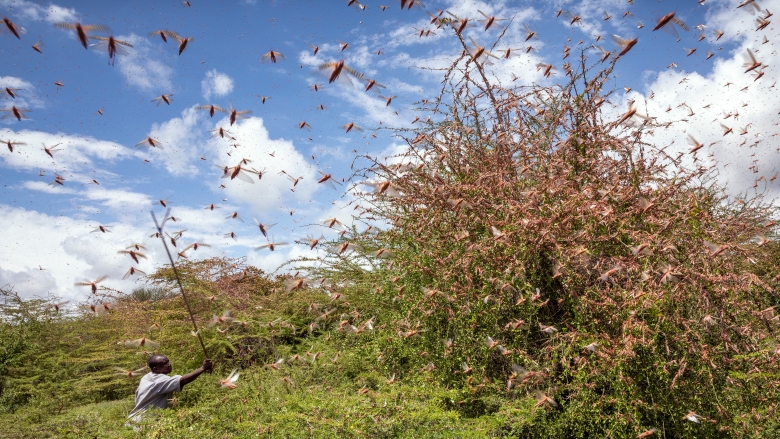
Photo: Sven Torfinn, Kenya, Katitika village, Kitui county, January 2020 Desert locusts have swarmed into Kenya from Somalia and Ethiopia, destroying farmland. Farmers trying to chase locust away. --------------------------------------------------------------- sven torfinn photography p.o.box 1293 00606 nairobi kenya + 254 (0) 733 723218 sven@sventorfinn.com --------------------------------------------------------------- www.sventorfinn.com ---------------------------------------------------------------
A high-level regional workshop aimed at enhancing the management of desert locust information has opened in Dakar, Senegal, amid growing concern over rising infestations across North and West Africa.
Held from August 4 to 8, the session brings together national experts from member countries of the Commission for the Control of the Desert Locust in the Western Region (CLCPRO), alongside officials from the Food and Agriculture Organization (FAO) and the Senegalese government.
The workshop focuses on equipping field agents with the technical capacity to collect, analyze, and share accurate data—seen as a cornerstone in the fight against this devastating transboundary pest.
“Effective management of locust information is becoming a fundamental pillar of any prevention and control strategy. And prevention also means information,” said Ousmane Mbaye, Secretary General of the Ministry of Agriculture, Food Sovereignty and Livestock, while representing the minister at the opening ceremony.
He praised the initiative as “both technical and strategic for food security,” expressing hope that it would “strengthen their knowledge of data collection and exploitation tools, and improve the quality of the monthly bulletins on the locust situation.”
Hichem Dridi, CLCPRO Program Officer, issued a stark warning regarding recent developments.
“Since late 2024, several countries have faced unusual infestations in areas that had previously been spared. This is most likely linked to climate change, which is beginning to manifest itself in a very visible way,” he explained.
He stressed the urgency for a robust, responsive, and harmonized locust information system. “Without accurate and well-processed data, any intervention planning becomes random,” he said. “Today, while we are investing enormously to achieve food sovereignty, all of this can be wiped out by a locust invasion.”
The workshop includes hands-on training in modern surveillance tools, including eLocust3, QGIS, RAMSES, and Google Earth Engine (GEE), with modules also covering drone use, geospatial analysis, and the production of monthly bulletins.
Dridi emphasized the value of skilled personnel. “We have qualified information officers who have been trained for several years – it takes an average of five years to train a good officer. Thanks to the continuous upgrading of these experts, the information remains of high quality.”
Funded by the CLCPRO Trust Fund, the workshop is part of the 2025 Action Plan and the broader 2023–2026 Regional Training Programme, delivered in collaboration with Senegal’s Directorate of Plant Protection.



